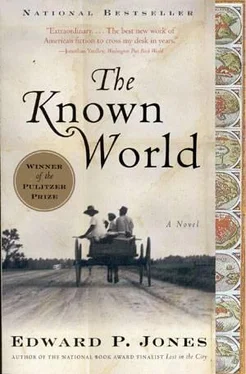He wrote, as always, to a Harry Sanderson, who was a kind of liaison at the Capitol and was generally helpful when Skiffington needed a circuit judge to come by and preside over a matter. “I have the Governor’s ear,” Sanderson wrote in a curious aside in one letter. Now, Skiffington said, something was amiss with the man Darcy but he needed help in determining what that something was. He wanted to know what the law wanted him to do.
Two days later, in response to one of his telegrams, he heard from a sheriff near the North Carolina border. Darcy had passed through, he said. There had been no trouble, “air undisturbed” was how he put it, but after Darcy left the county the sheriff had discovered a dead Negro child on the side of the road, “not a member of our community, as far as we can tell.”
He got a letter from Sanderson three days after that. A crime had indeed been committed, he wrote, and Sanderson included material he had copied from books saying so. Skiffington heard from Richmond again four days later. In handwriting he did not recognize, a Graciela Sanderson let him know that her husband, Harry, was dead and that she was now charged with keeping up his correspondence. He read the eight-page letter twice but he found nothing in it about what Virginia was doing about the crime of selling free Negroes. The widow told him about her husband, how she had met him when he vacationed in Italy, how he had wooed her, brought her to America after their wedding, and made her a happy woman in Richmond, “where the Governor is in residence.” She closed the letter with two paragraphs about the recent “discouraging” weather in Richmond, and then she asked Skiffington if she should return to her home in Italy, “where the sun is not as spiteful,” or remain in the Capitol where her children and grandchildren were prospering. “I am despondent and I await some answer from you about what I should do.”
He would get more letters from her over the next few days but there would not be time to write her back.
At Hazlehurst, Georgia, just beyond the Altamaha River, Darcy and Stennis met a man outside a saloon. The man was somewhat tipsy but quite alert and he had a Negro beside him. It was evening but there was enough light for the white man to see Augustus in the back of the wagon.
”He’s good flesh,” Darcy said.
“Good flesh,” Stennis said.
“I ain’t in the business for no slave right now,” the man said, one hand on the floor of the wagon.
Darcy said, “Four hundred dollars. Just four hundred, it don’t get any better than that.”
The man hiccuped. “Anything can get better on another day.” The Negro with the white man had stayed near the saloon but now he came down to the street and looked up at Augustus and they nodded at each other.
“Not with this it don’t,” said Darcy. “Four hundred dollars is all I’m asking and I’ll go home tonight and cry bout how you cheated me with that.”
“That price seems a bit much to me,” the man said.
“Not from where I’m standin and I’m standin in good boots. I paid five hundred dollars for this nigger up in Virginia.”
“We a whole lot smarter about our money in Georgia.”
“Yes, you are,” Darcy said. “You certainly are. Why, just the other week when I was up in North Carolina, I said to a gentleman and his gracious and hospitable wife-I said, ‘You can’t beat the Georgia people for their knowledge and intelligence. You can’t beat it with a stick.’ And they agreed.”
“Two sticks,” said Stennis. “Three sticks. Four sticks.”
“Why, I said, Georgia done give us our best president yet.”
“What?” the man said. “What president?” He seemed to sober up.
“I said you can’t beat the Georgia folks for what they gave and give and will continue to give this country, startin with that fine president.”
“What? What kinda president you be talkin about?” He put the other hand on the wagon’s floor, then shook Augustus’s chain. “What damn president you talkin about?”
“Why, the president of the United States, of course. What other kind of president is there?”
“No other kind,” Stennis said.
“There ain’t been no Georgia president of the United States far as I know.” He hiccuped. “I ain’t heard of one yet.”
Augustus and the Negro with the white man had not taken their eyes from each other.
“Why sure, there has been, sir. He was a fine president, too. What was his name, Stennis?”
“Lemme see. Whatn’t that President Bentley? I think it was.”
“Yes, President Bentley fom Georgia. Hooray for President Bentley. Hooray! Hooray!”
“I tell you there ain’t been no damn president from Georgia.”
“There ain’t?” Darcy said. “There ain’t? Well, there damn well should have been. And I’ll tell you somethin-there will be a president from Georgia and real soon.”
“Yes,” Stennis said. “There will be. There will be five at least, as far as I can tell. Maybe ten. Maybe ten. There’ll be ten if I have anything to do bout it. Could go to be twenty or thirty.”
“All right, Stennis, thas anough of that. You see, mister,” and Darcy took his hand. “I’m tryin to give you a good bargain in this here nigger. Just four hundred and fifty. Thas all I’m askin.”
“I thought you said four hundred dollars a minute ago.”
“Did I? Did I say that? Well, it jus goes to show how valuable this nigger gets every minute that goes by. Lordy lordy! Why, in another hour this nigger be so valuable you couldn’t buy him if you was the king of England.”
“I have to be going,” the man said, “I got the queen of England waiting for me.”
“Please, sir,” Darcy said. “Maybe three hundred and fifty, and I’ll be crying in my soup tonight about that.”
“No.” The man began walking away. Darcy followed him and Stennis followed. The Negro stayed with Augustus.
“Three hundred? Two hundred and fifty. Two hundred.” Darcy tugged at the man’s sleeve.
“No. Come along, Belton,” he said to the Negro, but the slave did not move.
“Please. Two hundred dollars. What you want me to do, give him away?”
“That would be a good notion. Come on, Belton,” and both men disappeared around a corner.
“Damn damn damn,” Darcy said, looking at the space the man had just occupied. “You think I was too hard with the bargainin, Stennis.”
“No, Master, I think you was right on the money.”
“Hmm. Well, we best get to beddin down with this fella. I hate to think about headin into Florida. I don’t see good luck in Florida, but tomorrow is another day.”
“And another dollar, Marse.”
10 A Plea Before the Honorable Court. Thirsty Ground. Are Mules Really Smarter Than Horses?
The day Skiffington first came out to Caldonia’s place about Alice and Priscilla and Jamie disappearing, Moses had expected to eat supper again with Caldonia that night, but she was not hungry and the dinner meal would be the only one of her day. She had thought all that day that the three would return before nightfall, finding it difficult to believe that two women and a boy would leave what she and Henry had made. A man perhaps, someone like Elias or Clement, not a madwoman and a woman who seemed to adore her. She had informed Skiffington as a kind of courtesy to the law, but when he showed up and stood before her, the whole matter of the disappearances became more important than the nuisance she figured it to be. It was as if one of her bulls had escaped and before a servant could find and bring him back, he had not just run through someone’s fields but run over a child or two. A simple misdemeanor correctable with money had become a felony. What saved her was that she was the victim.
Читать дальше












